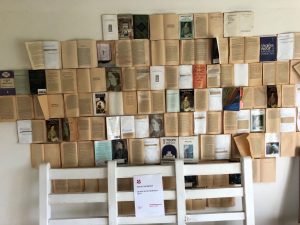A Visit to Monk’s House, by Manon Martini
‘An unpretending house, long & low, a house of many doors;’
As a student of English Literature, it is easy to spend your days getting lost in a remote vacuum of theoretical analysis and critical thinking, particularly when studying the complex works of Virginia Woolf. But sitting on a bench in the Monk’s House gardens, gazing off into the rolling South Down hills on a warm October afternoon, I was overcome with a sense of tranquility and a new closeness to the texts over which I had been losing my mind.

Manon Martini, 3rd year English Literature Student
The modest little cottage in the village of Rodmell, East Sussex was described by Woolf herself as ‘An unpretending house, long & low, a house of many doors;’ One cannot help but notice the parallels between the writer and her dwelling. The wonky little rooms and low windows seem timid at first, but with some patience you will find Woolf’s true personality shining through the exuberant blue walls of Monk’s House. From Vanessa Bell’s portrait of Virginia in the dining room to Tomlin’s unfinished bust on the windowsill, the cottage is saturated with her vibrant essence, and she watches as we meander through her home.

Virginia Woolf’s Writing Room at Rodmell
The reoccurring little doorways that appear through the length of the house transport you from one room to the next, little pockets of palimpsest, each with its own story to tell. The dining room for example, a converted bedroom with its wooden table and matching chairs, decorated by Woolf’s sister, Vanessa Bell. The room where the Woolf’s would have enjoyed tea with the likes of T.S Eliot and E.M. Forster. Or the tiny kitchen where she liked to make jam and bread, adorned with a painted cabinet and a little dog bed. Exiting the kitchen, you ascend a flight of steps and find yourself back in the garden.

Autumn in Woolf’s garden
Portrait of Virginia Woolf by Vanessa bellWandering along the garden’s brick paths I reach the pièce de résistance: The Writing Lodge. Neatly contained behind a glass screen like a puppy in a shop window, the room is on its best behavior, it wasn’t always this tidy! An unorganised writer, Woolf admits in a dairy entry: ‘the litter in this room is so appalling that it takes me five minutes to find my pen.’ From my place behind the screen, I could not help but imagine Virginia rustling through crumpled papers and manuscripts in search of her pen and ink. It is funny to think such a great mind can be so deeply human.

A Room of One’s Own – the many editions
Its not every day one gets to see the birthplace of such great texts as Mrs Dalloway, To the Lighthouse and The Waves, but doing so left me feeling inspired. Inspired to read, to write and to think. I would recommend paying a visit, Literature student or not.
